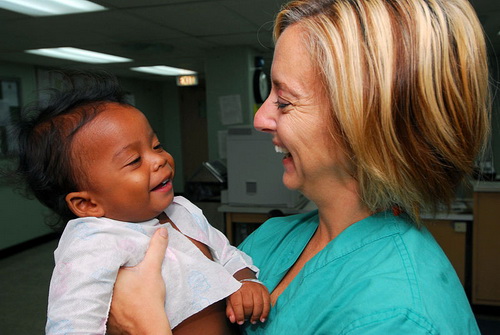
Ignoring doctor's orders
When it comes to your child's care, please don't think your pediatrician is the bad guy. In contrast, he is actually your best ally. He is probably the most experimented person (unless you are a five-time mom, then you might challenge him but still!) to know what the best recommendations for your kid are. Thus, it is in your best interest (and that of your child) to listen carefully to your doctor's recommendation when it comes to what's best for your kids. Do not decrease his medications because he finds it too bitter, or do not give him too many sweets because that's "all he can eat"! Parents need to cooperate with their children's health care providers to find out what the best solutions are for the kids, for any given problem.
- Important notification about information and brand names used in this slideshow!
- Photo courtesy of U.S. Navy photo by mass Communication Specialist 3rd Class Tyler Jones by Wikimedia Commons : commons.wikimedia.org/wiki/File:US_Navy_070709-N-6081J-138_Cmdr._Amanda_Simsiman,_a_doctor_aboard_the_Military_Sealift_Command_hospital_
- featuresblogs.chicagotribune.com/features_julieshealthclub/2010/06/childrens-health-five-common-mistakes.html
- http://www.pennlive.com/bodyandmind/index.ssf/2011/07/parents_mistakes_can_leave_las.html
- http://www.parents.com/health/medicine/antibiotics/medication-mistakes-parents-make/
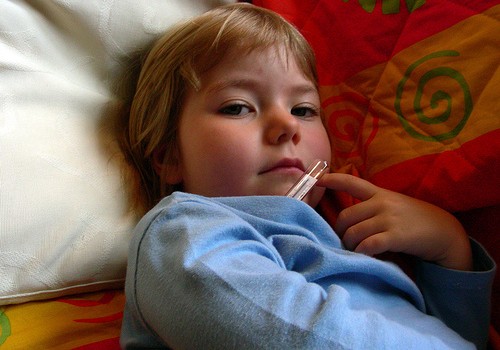
Fever Panic
You don’t need to panic every time your kid gets a fever! And how do you know your child has a fever anyways? Fine, his temperature readings might be higher than what you would expect, but like said before, every additional degree shouldn’t automatically be a source of worry. In fact, fever is a good thing. With every 1 degree increase, the heart beat increases by 10. And what does that mean for you? This means that the heart can pump the blood faster and dispatch white blood cells more quickly to fight the infection, if there is any. And fever can kill viruses too! The rhinovirus – most common virus responsible of the cold – cannot survive in warm environments. So being a little feverish is a win-win situation! However, it your kid’s skin is melting hot, this is definitely a red flag. Additionally, a fever in a "newborn" is definitely a problem, and no need to wait before consulting a pediatrician.
- Important notification about information and brand names used in this slideshow!
- Photo courtesy of victor abellón by Flickr : www.flickr.com/photos/vabellon/243105152/
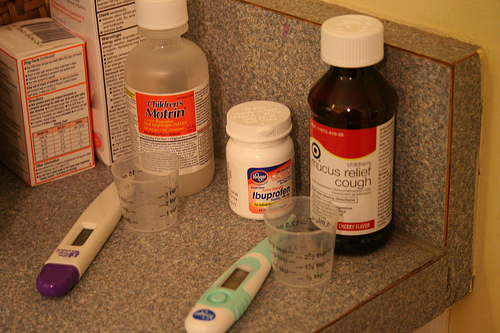
Giving a Child Cough and Cold Medicine at the Same Time!
No mama, this is nothing like killing two birds with one stone. Or one bird with two stones. Even though it hurts to see how that sneezing and coughing makes your kid miserable, giving him excessive medication is not the solution. The administration of a cough and a cold medicine could lead to an overdose of medications, and since your child’s liver is not yet as efficient as yours in eliminating medications swiftly, the effects of those drugs could be so detrimental that little Johnny might end up spending the night in the Emergency room. Every year, about 70 000 children in the USA suffer from accidental medication poisoning, and we wouldn’t want your child (and any other) to have to go through that.
- Important notification about information and brand names used in this slideshow!
- Photo courtesy of Malia by Flickr : www.flickr.com/photos/malia111/3907673007/
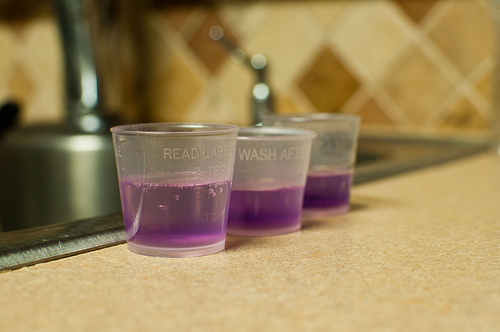
Dosing Medications Based on Your Child's Age and Not His Weight
There is a reason why medication dosage is based on our weight, and not our age. When we take medications they are absorbed by our digestive system, taken up in the blood and spread to all our organs (or at least, those where receptors can be found for those medications). Additionally, some medications tend to stay in the body longer than others, simply because they have a higher affinity for fat. And since fatty tissue is present almost every where and in every organ (even as part of cell membranes), those medications could penetrate all organs. Now, imagine that such a fat soluble medication is given in excess. It would stay in the body longer, and cause more damage. This is why medication dosage depends on our amount of fat tissue (or more generally, on our weight) instead of our age.
- Important notification about information and brand names used in this slideshow!
- Photo courtesy of Melanie Holtsman by Flickr : www.flickr.com/photos/holtsman/4577259238/
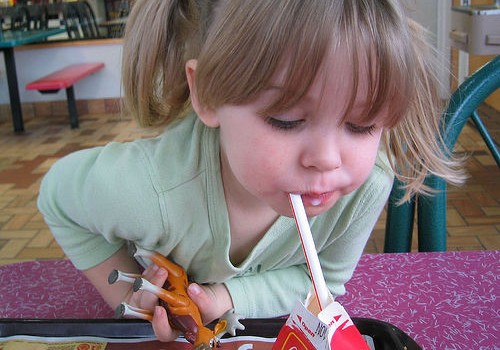
Juice or Milk Overdose
Undoubtedly, milk is the number 1 source of calcium for newborns, children and teenagers. It is crucial to have a calcium-rich diet to ensure proper growth and strengthening of the long, short and soft bones, as well as growth of the teeth. However, drinking too much milk could cause more damage than good. Not only hypercalcemia (presence of excessive calcium levels in the blood) could develop as a long term complication, but also; drinking milk gives a sense of fullness which can prevent the child from wanting to drink or eat other foods. As for non-natural juices, the main health concern is the potential addiction to sugar that they may cause.
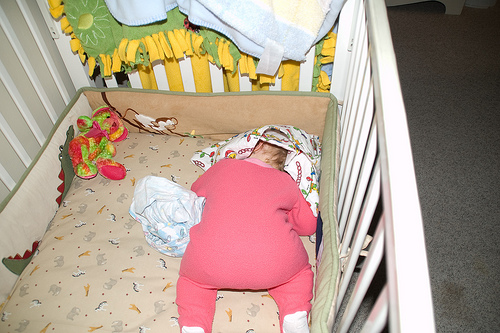
Putting Blankets in the Crib
Hum...this is a tough one. It's your first baby, and you really want to make sure that you get every single thing right. It's cold outside, and you are scared that little Johnny might catch a cold, so head up to his crib and give him some blankets. Well, here is the thing: infants and toddlers tend to rotate a lot when they sleep (adults do too, but in children it is much worse). Because they cannot control themselves and are not fully aware of their environment, there is a possibility of asphyxia under the extra blankets. And this is surely one of the medical emergencies you wouldn't want to see happen in the middle of the night, or at any time as a matter of fact. Prevention is always better than cure:)
- Important notification about information and brand names used in this slideshow!
- Photo courtesy of Andrew Bardwell by Flickr : www.flickr.com/photos/abardwell/2322978089/
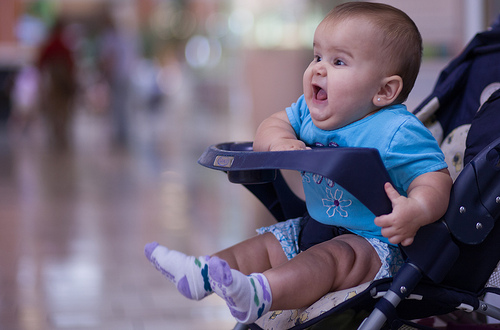
Taking a Newborn to Crowded Places
You just gave birth, and you are so excited to show the world your bundle of joy, and how that little addition to the family makes you happy:) But be careful, the world might mot be so friendly... at first! The problem with crowded places is the fact they are the perfect and the biggest nest for germs. Everyone of us possesses some microbial flora, make no mistake. However, because we have been living in this world much longer, our body is somehow insensitive to all those seemingly harmful germs around us. But we wouldn't say the same for a newborn's immune system. So, avoid bringing your newborn baby in places like vegetable or meat markets, parks, or public hangouts.
- Important notification about information and brand names used in this slideshow!
- Photo courtesy of Eduardo Merille by Flickr : www.flickr.com/photos/merille/8001774896/
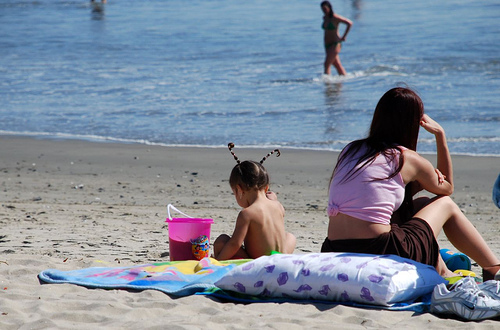
Forgetting the Sunscreen
We tend to be excited for beach days, especially beach days spent in family! However, this could instantly turn into a disaster if you forget to walk along with all the tools and products that you need, including the sunscreen. And it is even worse if you forget that you forgot the sunscreen, and at the end of the day you only realize it when you notice tour toddler crying over his reddened skin and you realize you have to let him have a milk bath. As dangerous as sunburns are in adults, they are even much worse in children. And make no mistake, dark skinned children could be affected too!
- Important notification about information and brand names used in this slideshow!
- Photo courtesy of Malingering by Flickr : www.flickr.com/photos/malingering/421648862/
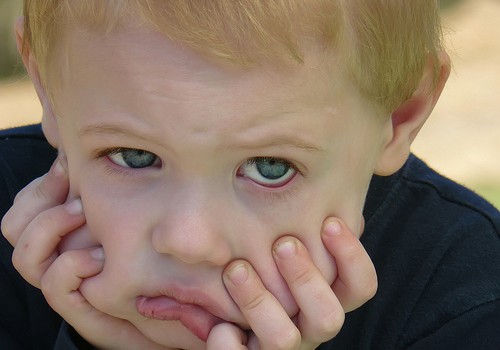
Parents' Mistakes Can Leave Lasting Impact
Every parent can make mistakes, whether it is their first kid or they have been in the parenting game for a while. Learning is a continuous experience, and it only truly stops when we leave this world. So, just like at school, making mistakes is part of the teaching. However, there are some mistakes that can truly leave a lasting impact in your kid's life and the way he conceives the world. Henceforth, we cannot emphasize enough on how important it is to always be on the alert about the way we speak to or in front of our kids, the way we act in front of them and the way we feed them. And when we are wrong, it is important that we take the time to step back and apologize. With that, your kids would surely follow your lead on the path of humility.
- Important notification about information and brand names used in this slideshow!
- Photo courtesy of Dale Moore by Flickr : www.flickr.com/photos/dalemoorephotography/4445558459/

When to Really Worry
Okay, now after all that has been said and done, how would you know that it is truly time to worry about something you might have done (or that might have happened) to your kid? If you notice that your child is starting to behave differently (make sure it is not a repetitive tantrum, because those are simply corrected on their own), if there are any changes in his eating patterns (eats less, eats more, etc.) or sleeping patterns (recurrent nightmares, excessive bed-wetting even though he is passed the age, etc.), you should step back and try to analyze what has happened in the last few days (or weeks) to lead to such changes. And while you are at it, seek professional medical advice.
- Important notification about information and brand names used in this slideshow!
- Photo courtesy of Jason Meredith by Flickr : www.flickr.com/photos/merfam/238899198/



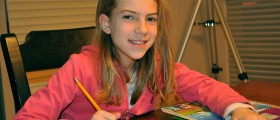


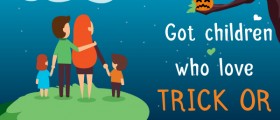
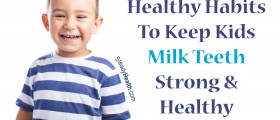










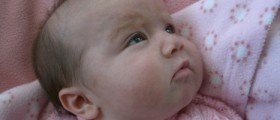
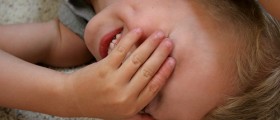
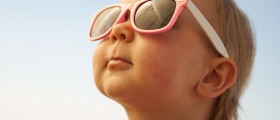



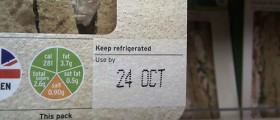


Your thoughts on this
Loading...